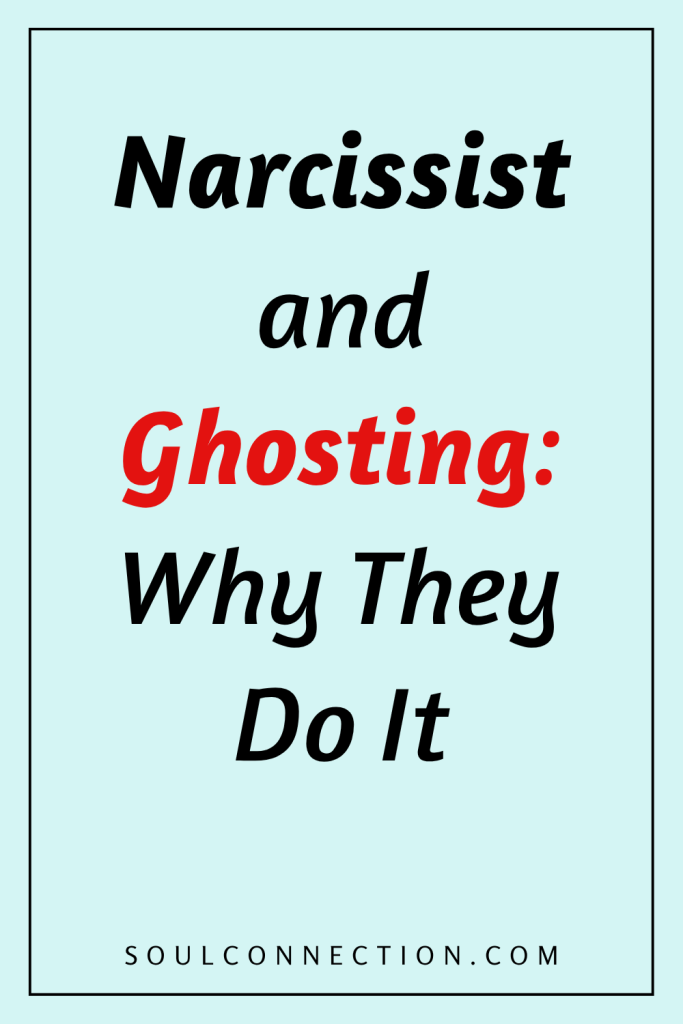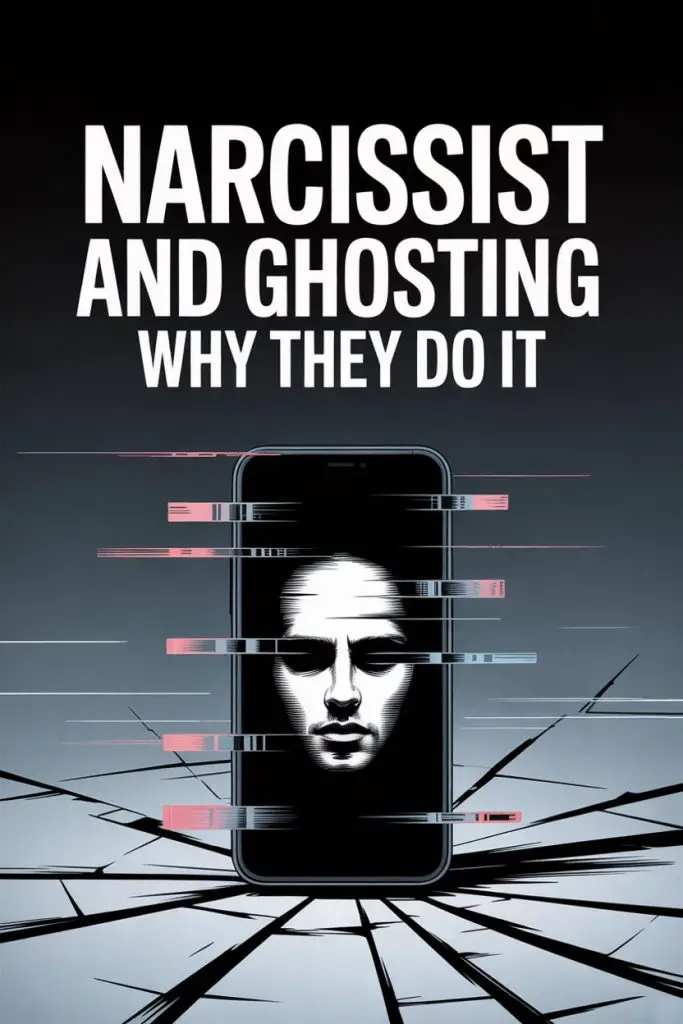Ghosting is the emotional equivalent of someone running out for milk and never coming back. Only, instead of milk, it’s basic decency and closure you’re left waiting for.
When the person doing the ghosting is a narcissist, it feels even more bewildering—like getting dumped via interpretive dance. Why do narcissists ghost, and why does it sting so much?
Pull up a chair. It’s time to unpack this psychological disappearing act.
The Narcissism Primer Nobody Asked For
Before blaming every person who’s ever left your message on “read” for being a narcissist, a quick refresher: Narcissism isn’t just someone who takes a lot of selfies.
It’s a personality style defined by an outsized sense of importance, a breathtaking lack of empathy, and an undying hunger for admiration.
Picture someone who walks into a party and wonders why nobody’s standing for their entrance. That’s the vibe.
Now, narcissists aren’t necessarily evil masterminds (though some do seem to have missed their calling in daytime soap operas). They’re just operating with a set of emotional tools that are, let’s say, missing a few screwdrivers.
Ghosting as the Eject Button
For most people, ghosting is a last resort—reserved for creeps, trolls, or that one guy who brought up cryptocurrency on the first date.
For narcissists, it’s an art form. It’s not simply avoidance or laziness; it’s a power move.
Narcissists ghost because it lets them exit a relationship without messy explanations or consequences.
No confrontation. No messy emotions. No having to witness the fallout of their actions.
In a narcissist’s world, this is a win-win—unless you count the ex they’ve left in digital purgatory.
The Sweet, Sweet High of Control
Ghosting isn’t just about disappearing—it’s about dominating the narrative. Narcissists are known to love control the way most people love three-day weekends.
By ghosting, they decide exactly when contact ends, on their terms. The uncertainty left in their wake? That’s just the cherry on top.
The recipient, meanwhile, spirals through confusion, self-doubt, and the urge to send one last “Hey, just checking in!” text (don’t do it, by the way).
The narcissist, meanwhile, basks in the silent power of being the one who finished the conversation.
Avoiding Accountability (It’s Practically a Sport)
If accountability were an Olympic event, narcissists would compete with the enthusiasm of a toddler on a sugar rush. Emotional responsibility isn’t their forte.
Explaining why they want out would mean owning their feelings—or, even scarier, acknowledging yours.
Instead, they pull a Houdini. Out of sight, out of responsibility. You can’t process a breakup, or get closure, if you’re still waiting for a reply to “How was your day?” from three weeks ago.
The Thrill of the Return
Ever notice how some ghosts like to haunt? Narcissists often circle back after ghosting. The technical term is “hoovering” (as in, vacuuming you back in).
They might pop up months later with a “Hey stranger” text, expecting you to be delighted (or at least moderately flattered).
This on-again, off-again routine feeds their ego. After all, if you respond, it must mean you’re still thinking about them, right? Never mind the fact that you’re just bored at the dentist’s office.
Emotional Detachment: The Unofficial Narcissist Motto
Empathy is the glue that holds relationships together. Narcissists, unfortunately, use it sparingly, like that fancy balsamic you save for guests.
Their emotional disconnect makes ghosting easy. They don’t feel the same pangs of guilt that keep most people up at night.
This isn’t an excuse—it’s an explanation. The narcissist’s inability to connect with other people’s feelings means your confusion or pain simply isn’t on their radar.
Fantasies of Idealized Love
Narcissists love the “honeymoon phase”: attention, admiration, the shiny newness before things get real. Once the sparkle fades (as it inevitably does), they lose interest.
Rather than work through the inevitable bumps, they’d rather vanish and chase the next hit of infatuation.
Relationships that demand vulnerability or emotional work are a hard pass. Ghosting is their shortcut to the next fantasy.
Dodging Criticism Like It’s the Plague
Narcissists are allergic to criticism. Any hint of dissatisfaction—no matter how small—feels like a personal attack.
If they sense you might call them out, set a boundary, or (heaven forbid) ask for basic respect, they’re more likely to disappear than deal with the fallout.
No conflict, no complaints, no accountability. Just sweet, blissful radio silence.
The Relationship as a Resource
To a narcissist, relationships serve a purpose: validation, attention, status, emotional support. Once the relationship stops feeding their needs, they see no reason to hang around. Instead of expressing this (or, you know, being human about it), they just check out.
The relationship becomes like a phone battery—once it’s dead, they simply unplug and move on. No charger in sight.
Why Ghosting by a Narcissist Hurts More
Getting ghosted by anyone stings, but when it’s a narcissist, the pain comes with bonus confusion.
Narcissists are often charming, attentive, and laser-focused at first. Their withdrawal feels like an emotional whiplash.
You might question your worth, your judgment, even your basic understanding of human decency. Did I do something wrong? Was it all fake? Was it me, or was it them? (Spoiler alert: It was almost definitely them.)
Breaking the Cycle
Ghosting by a narcissist can leave anyone feeling like a contestant eliminated mid-season from a reality show they didn’t even know they were on. Recovery starts with reclaiming your narrative—and your dignity.
No need to chase answers from someone who can’t give them. Closure isn’t something they’re equipped to provide. Instead, focus on what you can control: your healing, your boundaries, your next steps.
Reach out to friends who remind you what healthy connection looks like. Keep your phone away from any late-night “just one more text” lapses.
Unfollow or block if seeing their name gives you heartburn. This isn’t about pettiness; it’s about peace.
Ghostbusting Starts With You
Waiting for a narcissist to explain their behavior is like waiting for your cat to apologize for knocking over your favorite mug. The apology isn’t coming, and neither is closure from someone who’s already halfway out the door.
The good news: you don’t need it.
Your job isn’t to diagnose narcissism, play detective, or fix someone else’s emotional tool kit. It’s to protect your own heart (and, if necessary, your Wi-Fi password).
Ghosting is a reflection of the ghoster—not the ghosted. The next time someone pulls a vanishing act, channel your inner detective, but only long enough to block and move on.
The world’s still spinning, your value hasn’t changed, and the only thing that needs to disappear is their place in your mind.
Healthy relationships don’t require psychic powers or emotional scavenger hunts.
They require two people who stick around for the hard parts—even if it means awkward conversations or the occasional difficult goodbye.
Save your energy for those who show up, not those who fade out. Trust me, your future self will thank you.


